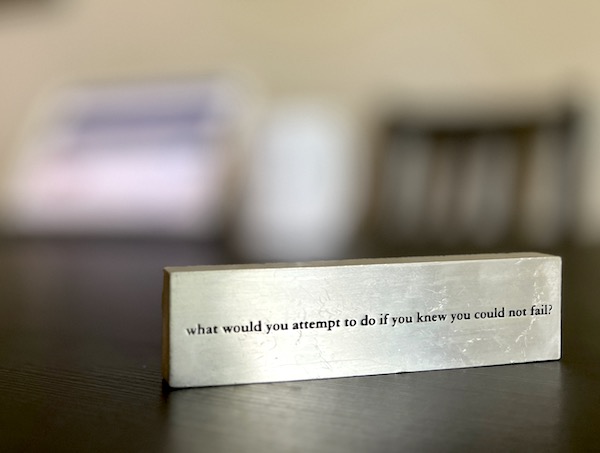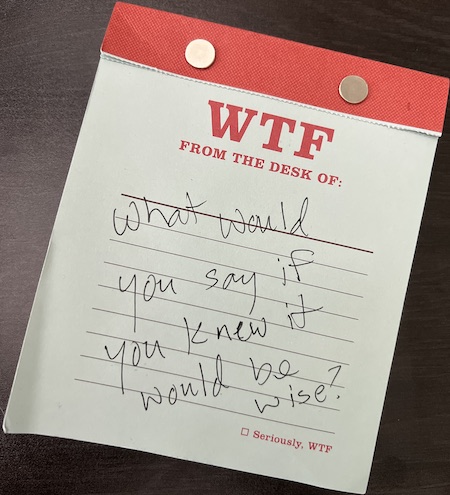How paperweight wisdom can kill critical thinking
My manager introduced me to paperweight wisdom many years ago when she gave me a metal paperweight with this quote engraved on it:
What would you attempt to do if you knew you could not fail?
Either Eleanor Roosevelt or Robert H. Schuller, depending on which link you click
Apparently it’s supposed to motivate people to overcome their fears and think big, but I don’t really get it. I attempt things all the time that might fail. In fact, I fail all the time. Life would be boring without failure.

Hmm, that might also be a good pull quote.
Life would be boring without failure.
Peter Dudley
And since we’re quoting things, this is a good one, too:
It’s only life after all.
The Indigo Girls
Over the years, I’ve been given other desk tokens with generic, vaguely wise-sounding sayings on them. I call these things paperweight wisdom.
And they’re fine. Mostly they tell me what I already think and believe, and if I keep them handy they might inspire me to re-center myself sometimes.
But not one of them will ever create new enlightenment, insight, or behavior change.
Wise sayings feed our existing biases
Most fridge magnet wisdom is benign in that it generates a lot of likes on social media without doing too much damage. In most cases. It’s intellectual cotton candy—wispy, sticky, sweet, and indulgent.
Much of paperweight wisdom is similarly benign. What would I attempt if I knew I could not fail? Um… win the lottery? Try out for the national soccer team? 🤔
But some of it is more insidious. Fridge magnet wisdom and paperweight wisdom feed our existing biases and reinforce what we already think.
That’s because of confirmation bias. If we disagree with the aphorism, we simply discard it. The ones we capture and hold on to are the ones that speak to us in some way, that we see as wise or insightful or inspiring.
We see our existing value system reflected in them, so we collect them and refer to them because they reassure us.
Sometimes it may help us see farther, or more clearly, or from another perspective. More often, however, we take it as justification for what we were planning on doing anyway.
A real example: scaffolding without substance
Today I read a post that said business leaders should make decisions based on “long-term shareholder value.”
On the surface, that sounds like pretty solid business advice. Who could possibly be against long-term shareholder value? No one, that’s who.
The author of the article is sure to be praised for their astute leadership. The post will get tons of likes, no doubt. But here’s my problem with it.
Let’s start with the fact that all three parts of it are subjective and negotiable.
- “long-term” could be one year a hundred years.
- “shareholder” usually implies someone who owns stock, but not always.
- “value” is exciting for how breathtakingly vague it is.
If two people from different backgrounds with different perspectives and agendas both use “long-term shareholder value” as their decision guide, they may come up with very different conclusions.
A front-line employee struggling to pay their bills may think that cutting health benefits and rolling back environmental regulations will hurt long-term shareholder value by destroying the environment and neglecting employees.
C-suite executives and finance managers, however, might see those tactics as the best way to ensure long-term shareholder value—by controlling costs and overhead to sustain profit margins.
This is how people use a phrase like “long-term shareholder value” to justify and affirm their own opinions.
And that’s the problem: Both paperweight wisdom and fridge magnet wisdom give us scaffolding without substance.
We then fill in all the details ourselves, manufacturing a conclusion that is tailor-made to match the worldview we already hold. Et voila! Our own wisdom and intelligence are confirmed, and anyone who disagrees with us is a knucklehead.
Another real example: enabling discrimination
Today I ran across this on LinkedIn:
NEVER SAY, “That’s not my job….” Period. Even when nobody’s watching.
LinkedIn poster who was praising servant-minded leadership
Most of the commenters agreed, then trumpeted their personal commitment to do whatever is necessary whether anyone notices or not. Even if it’s cleaning the toilets.
I am a firm believer in pitching in for team goals. I’ve worked in startups and nonprofits where job descriptions are mostly other duties as assigned. These were some of the most engaged, creative, and fun teams I’ve been a part of.
I’ve also worked with “not my job” people, and they can create a bitter environment for everyone else. Whether they’re divas or slackers, their reluctance causes resentment among the problem solvers.
So, commitment to teammates and team goals: yes!
But this bit of paperweight wisdom has its own dark side: it can be used to justify and perpetuate workplace discrimination or even abuse.

Some of them do, I think.
In logic, when a statement is true, then the contrapositive is also true. That is, if the statement if A then B is true, then the contrapositive if not B then not A is also true.
Thus, if you insist that a good worker never says “that’s not my job,” then you also insist that if someone ever says “that’s not my job,” then that person is not a good worker.
That is, if the person tries to enforce any personal boundaries, they should be considered a bad worker.
That seems so extreme on its face you probably already see where it’s flawed. But let’s go a step farther. Consider these facts (the first two are from the Family Caregiver Alliance):
- An estimated 66% of caregivers are female.
- The average caregiver is a 49 year old woman who works outside the home and provides 20 hours per week of unpaid care to her mother.
- On average, at work women are paid just 82% of what their male counterparts are paid.
We haven’t even touched on racial inequity, childcare burdens, commute, disability, chronic conditions, considerations of faith, or any other dimension that makes up a whole person.
So, if you’re a woman with children, caring for your aging or sick mother, getting paid less than your male colleagues, and relying on public transit for your 45 minute commute… being told you can NEVER SAY it’s not my job is essentially being told you are not allowed to have boundaries at work.
Even a well-meaning manager may unconsciously rely on this bit of paperweight wisdom when deciding bonuses, promotions, and pink slips. After all, being team-oriented is the heart of our workplace culture, team! Never say it’s not your job!
And then there are the managers who knowingly use ideas and sayings like this as a cudgel to control and discriminate against certain employees. You may have worked for someone like that.
Please, let’s all think a bit more deeply about these simpleminded aphorisms before amplifying them and working them into our team culture.
The way to enlightenment is critical thinking
Paperweight wisdom kills critical thinking before it even has a chance to get started. Every time we jump at the call of confirmation bias, we rob ourselves of an opportunity to learn, and we limit our own potential.
Some people do this intentionally. They actively look for reasons to behave badly because external approval absolves them of blame and frees them from introspection. Paperweight wisdom, with its empty scaffolding and shallow thought, gives people the permission they want to behave badly.
You can’t change those people. I can’t change those people. They don’t want to change. They are the reason society continues to become more and more divided, as they justify away their lack of critical thinking.
But you don’t have to be one of those people. You can choose to empower yourself by being more open-minded and self-aware.
All you have to do, whenever you see a statement that makes you go “yes!” is pause a moment and think more deeply about it. Imagine a person with opinions diametrically opposed to yours. Imagine them also saying “yes!” to the same statement. What in that statement would inspire such a different person to agree?
Who could be against long-term shareholder value? No one, that’s who.
Who could be against contributing to team goals? No one, that’s who.
If your arch nemesis agrees with the same aphorism that you love, wouldn’t you be curious about how they interpret it? Either you both fully agree with each other, or you’re both interpreting the same statement to mean very different things.
My point here is not to change anyone’s opinions and biases. Diversity of thought is important, and there’s rarely just one right answer to any complicated problem. And, I’m not trying to take the fun out of quoting people. Just because a bit of paperweight wisdom can be used negatively doesn’t mean it’s not right a lot of the time, or it’s not amusing.
My point is that when people go around chirping pithy sayings that appear to boil down the complexity of life or business into a simple aphorism, they are more likely displaying shallowness of thought than profound wisdom.
And when that simple aphorism really speaks to you, instead of clicking “like” and scrolling past, pause a moment to reflect on how it may be engaging your confirmation bias, and how it might be doing nothing more than reinforcing your own worldview and entrenching you further in poorly thought through yet unshakable opinions.
I can help.
I work with top executives and middle managers to improve their leadership skills and the effectiveness of their teams. I also help individuals identify and achieve their personal goals. Would you like to be more effective, be more empowered, and feel fully prepared for your next steps?
[ insert your favorite shallow yet wise-sounding aphorism here so you feel positive about this post ]
You can help.
Think of one person who would benefit from reading this post. Sharing is caring!* Forward it to them right now. They will think you’re super smart and well informed.
* included ironically for the purposes of this post



4 Comments
Trouble saying no? Think about how to protect your yeses. · January 21, 2024 at 7:50 pm
[…] There are times, of course, when saying yes to someone’s request makes perfect sense. There’s no need to turn into a selfish jerk in a slavish devotion to a bit of paperweight wisdom. […]
Five characteristics of resilient teams - Gray Bear Coaching LLC · May 27, 2024 at 12:57 pm
[…] articulated fact. They do TED talks. The idea worms its way into meetings like a game of telephone, losing clarity and nuance along the way. It morphs and metastasizes until it becomes the most dominant idea in the […]
Critical thinking in the little moments - Gray Bear Coaching LLC · June 10, 2024 at 4:15 pm
[…] It’s the same concept behind fridge magnet wisdom and paperweight wisdom. […]
Self-assuredness is the enemy of leadership - Gray Bear Coaching LLC · August 31, 2025 at 1:52 pm
[…] All this time, the self-assured leader’s certainty in their own approach gets reinforcement from several quarters: like-minded peers, sycophantic subordinates, sympathetic friends and family, paperweight wisdom. […]